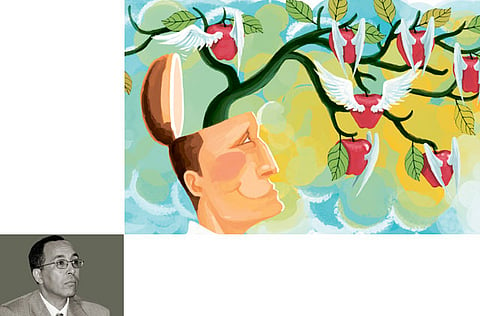Learning to guess is an important part of education
Combining essential knowledge, mental skills and critical thinking can produce simple solutions to problems

What is education? Ah, that perennial question … In ancient times, education consisted of learning some important ‘arts': how to speak well, how to behave well, how to manage affairs well ... And for this, one needed to know a number of things: facts, ideas, proverbs or wisdoms, verses, etc. The more one knew, the better one could display those forms of education.
As the world became more and more complex, the quantity of things one needed to know grew exponentially, and one's education depended greatly on one's ability to memorise and to use facts/knowledge in the right instances (Google and Wikipedia had yet to be invented).
But as human civilisation progressed, reason became the essential element in dealing with many areas of life; education thus based itself on rigorous logic, ‘critical' thinking, and the ability to produce new ideas and solutions from the available knowledge. Memorisation became a dirty word, and memory came to be looked at as the simpleton's way of knowing things.
In fact, education is a combination of the above skills (and more), all of which we need today more than ever.
My students are often stunned to hear me ask them to estimate or even guess some answers. The expressions on their faces, and often the words from their lips, say it clearly: are you asking us to guess in a technical, scientific course at a respectable university? Yes, indeed, I not only ask my students to ‘educate-guess', I try to show them the importance of this skill and how to learn it.
It was the Italian-American Nobel Prize winning physicist Enrico Fermi who made this skill popular when he posed to his (doctoral) students such questions as: how many piano tuners are there in Chicago; how far can a duck fly; and other such strange questions, which ‘obviously' had nothing to do with science or with education … Answering these kinds of questions, for which one could never obtain a precise result, became known as ‘guesstimating' or performing ‘back-of-the-envelope' calculations.
Art of estimation
Why did Fermi want his students to be able to answer such questions? Why is this guessing/estimating an important skill to acquire? I tell my students (most of whom are Engineering majors) that when they have an idea or a project they wish to propose to their supervisors, or if one of their staff members brings a proposal to them, that they better be able to quickly estimate the cost, the feasibility, the timescale needed, and the drawbacks in the idea under consideration. Moreover, if they want to convince their superiors of the need for some projects, they should be able to show simple and convincing numbers to the decision-makers.
For example, one should be able to estimate the amount of water lost in the undammed rivers of a given state, or the amount of time wasted by drivers or pedestrians or employees due to certain urban or architectural constructions, or the amount of energy that could be saved (and the attached costs) by placing solar panels on the roofs of a building. One simple and favourite question of mine is to ask students to estimate/calculate the amount of money they waste by skipping one class, knowing how much their parents have paid for their tuition in a given semester.
The tricky part is that for one to do a good estimate, one needs some facts/knowledge, some of which may not be available or easily accessible. And that is where the skill of ‘educated-guessing' comes in as an important tool. Conversely, when one is shown a result (say a student or an engineer brings me a calculation), one must be able to quickly check (by guesstimating) whether the result makes sense or not. This is where one combines some essential knowledge, some sharp mental skills, and some critical thinking. This is how the above components of education combine; this is what makes a smartly educated person in today's era of quickly accessible facts.
Now, before I conclude, let me offer you a few interesting ‘guesstimating questions' that you can attempt to answer as reasonably as possible:
- How many people in the world are talking on their cell phones at this moment?
- How much plastic waste do we in the UAE produce each day?
- How much money is lost (on average) when a plane is delayed by, say, two hours?
Einstein once said "everything should be made as simple as possible, but not simpler". By this he meant that one should be able to solve problems as simply (not as precisely) as possible, but simplicity must not sacrifice the above elements of: basic facts/knowledge, sharp logic/skills, and critical thinking. We need to integrate this more fully into our approach to education.
Nidhal Guessoum heads the Physics department at the American University of Sharjah.


